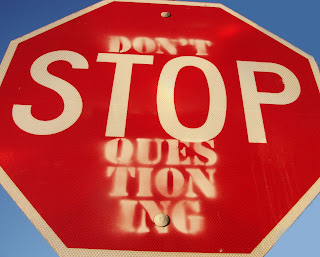"The important thing is not to stop questioning. Curiosity has its own reason for existing." - Albert Einstein
Traditional school curriculum defines answers and makes up questions. We need curriculum that defines questions and discovers answers... educators need to think differently. This came to me a while back as I was drifting through different Twitter conversations late one night. There is no exhaustive list of what we can know, but we've artificially created many lists of what we apparently need to know. In order to advance our practise beyond teaching to these lists, teachers would do well to revisit the domain of the question... we need to think differently.
I firmly believe that teachers understand the value of questioning, I'm not suggesting otherwise, but I am suggesting an adjustment to our perspective on questioning would improve our ability to practise teaching. The curriculum we establish in each grade is a great example of how we've become a bit controlling and predictable as professionals- we define the list of what kids should know, and then we make up questions to teach to the lists. I believe that we should state curriculum as questions needing to be answered instead of facts needing to be questioned. I envision curriculum statements not as outcomes to be achieved, but as questions to be answered. Making this change would change the culture of learning from a culture of standards that are exhaustive to a culture of standards that are limitless... limitless learning based on true inquiry, not the artificial inquiry we practise now.
Caveat: I am not an expert. I shudder to think in the context of this post that expertise is even possible. The topic of exceptional teaching and learning is about as fluid a topic that can possibly exist in my humble opinion, and my opinion is what I am stating in this post; take it or leave it. I'm not telling you what to do as educators, or parents for that matter... or even how to do it. I simply want to strike a chord of thought in you to reflect on as you develop your own perspective toward teaching and learning, and for the record, I don't believe this process ever ends for what parents and teachers should be first and foremost- conscientious learners.Most teachers waste their time by asking questions which are intended to discover what a pupil does not know, whereas the true art of questioning has for its purpose to discover what the pupil knows or is capable of knowing. Albert Einstein
I'm hearing much from my Twitter tribe about "what teaching is," and what defines a good teacher as major elements of the cognitive surplus running wild via the influence of social media. Teachers all have opinions on these points of discussion. We started to form them as undergraduate students in teaching colleges all over the world before we had any clue to an informed position. (As I think back to those days I wonder if it's a good idea to expect pre-service teachers to form a teaching philosophy... maybe it would be better to expose them to the myriad of teaching philosophies that permeate our craft, and let them pick one to start with, then begin to form their own... I digress.)
It seems to me that the entire process of contemporary education depends on what I will call the principle of predetermined principles. The profession of teaching and the process of learning is dependent on what we already claim to know about both entities. I'm not saying this is inherently bad, but it certainly can create some contextual problems as we define good teaching and learning. First-year teachers need a foundation to work from as they enter the profession; they benefit from the principle of predetermined principles as they experiment with different perspectives and ideologies on their way to defining their own. However, if they aren't inclined to question what they're doing and what they're believing constantly, then the context gets diluted. In the worst cases it gets diluted to the point of stagnation. Above all, good teaching and learning MUST include the element of questioning; we have to understand that discovery (learning) is an inquiry-based process, and not something that can have limits placed upon it.
Predetermined principles are important for students too. Humankind has built an incredible base of knowledge over our short history, and we can't discount this as teachers. We know what we know, and that's NOT a bad thing. (I'm growing increasingly disheartened by a stance among educators that appears to want to throw away virtually all previous practise and knowledge as if it were the 'wrong way' of our past to be replaced by the 'right way' of the present.) We need to understand that our past mixed with inquiry in the present will create many 'right' ways to do things in the future.
So here's my contribution to the discussions intending to define teaching and good teachers. (Wow... glad I'm not throwing the baby out with the bathwater on this one- Socrates knew this over two-thousand ago.) Teaching is the art of questioning, and it's not simple. Good teaching is nothing different. To me it's defined by the level of proficiency within the art of questioning one has developed. Even more importantly to me, great teaching is developed through a willingness to question not only our students, but ourselves; what we do and how we do it, everyday.
We grow as teaching artisans by using the Socratic method on ourselves in our reflection and review of our own practise. Don't accept your own comfortable place in teaching. Strive to operate in an environment of creative dissonance if you intend to grow as a learner along with your students.

